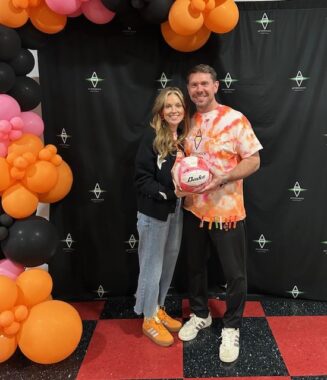Embracing my role as an MS advocate
Written by |


Denise Schneiders embraces her role as an MS advocate. (Photos courtesy of Denise Schneiders)
Day 28 of 31
This is Denise Schneiders’ story:
My life changed on March 12, 2024, with three words: “You have MS.”
As an athlete, wife, mother, teacher, coach, and business owner, I had always lived by a singular motto — the one printed on my clipboard: “Suck it up.” That phrase shaped how I parented, coached, and tackled challenges. But multiple sclerosis (MS) wasn’t something I could simply muscle through.

Schneiders is the player development coach at a volleyball club. The program is called DIGS, for “determined, intentional, grateful, selfless.”
The MS diagnosis was a shock. How could my body betray me? But I refused to let fear paralyze me. I quickly immersed myself in learning about MS and assembled a team of specialists, including experts from the Mayo Clinic, my local neurologist, and a naturopath. I chose a disease-modifying therapy, then endured a grueling yearlong battle with insurance to access the medication I needed. That struggle led me to the National MS Society and advocacy work.
Advocacy became my turning point — my way to transform what felt like defeat into empowerment. The coach in me knows you never really lose if you learn. I learned how to fight for myself and others. Some days were unbearable, with pain and fatigue as constant companions, but I found ways to cope.
One of those ways was something I stumbled upon by accident: “dopamine dressing.” I discovered that what I wore had a direct impact on my mood, which, in turn, influenced my pain levels. When I dressed vibrantly and saw others smile in response, I smiled back — and the more I smiled, the less I noticed the pain.
Beyond personal strategies, I used my fearlessness to push forward. The mindset of “the worst thing they can say is no” gave me confidence when I took on MS State Action Day at the Georgia State Capitol. This month, I’m bringing my advocacy to Washington, D.C., to fight for better care, research, and support for MS patients.

Denise Schneiders and her husband, David, own a volleyball club that includes 120 athletes.
Yet, the hardest lesson MS has taught me is the necessity of slowing down. I once believed that if I wasn’t moving, I wasn’t achieving. But I’ve learned that recharging isn’t quitting; it’s ensuring I can keep going.
When I think about why I advocate, I couldn’t say it better than my daughter, Hadley, did in her paper “A Legacy Beyond the Football Field: Gleason”: “Seeing her resilience firsthand has reinforced my belief that true leadership isn’t just about overcoming obstacles—it’s about turning them into opportunities to inspire and uplift others.”
Living with MS isn’t just about managing symptoms; it’s about showing up, pushing forward, and using my journey to make a difference.
My life may have changed because of MS, but who I am remains the same. I am still an athlete, a coach, a wife, a mother, a teacher, a businesswoman, and, most importantly, someone who does not quit. I refuse to let my diagnosis define me. Instead, I have redefined its meaning, turning it into a mission. MS is not just something I have; it’s a cause I fight for. I channel my energy into raising awareness, advocating for change, and pushing for what we, the MS community, truly need.
In recognition of Multiple Sclerosis Awareness Month in March, the MS Community Spotlight campaign features a series of stories highlighting the real-life experiences of people affected by MS, written in their own words. Follow us on Facebook, Instagram, X, and Pinterest for more stories like this, using the hashtag #MSSpotlight, or read the full series.


